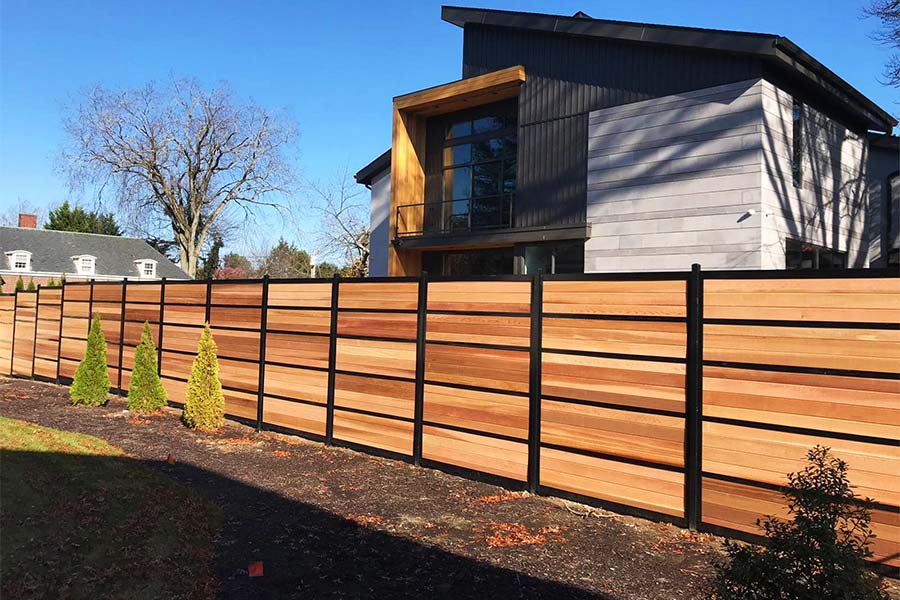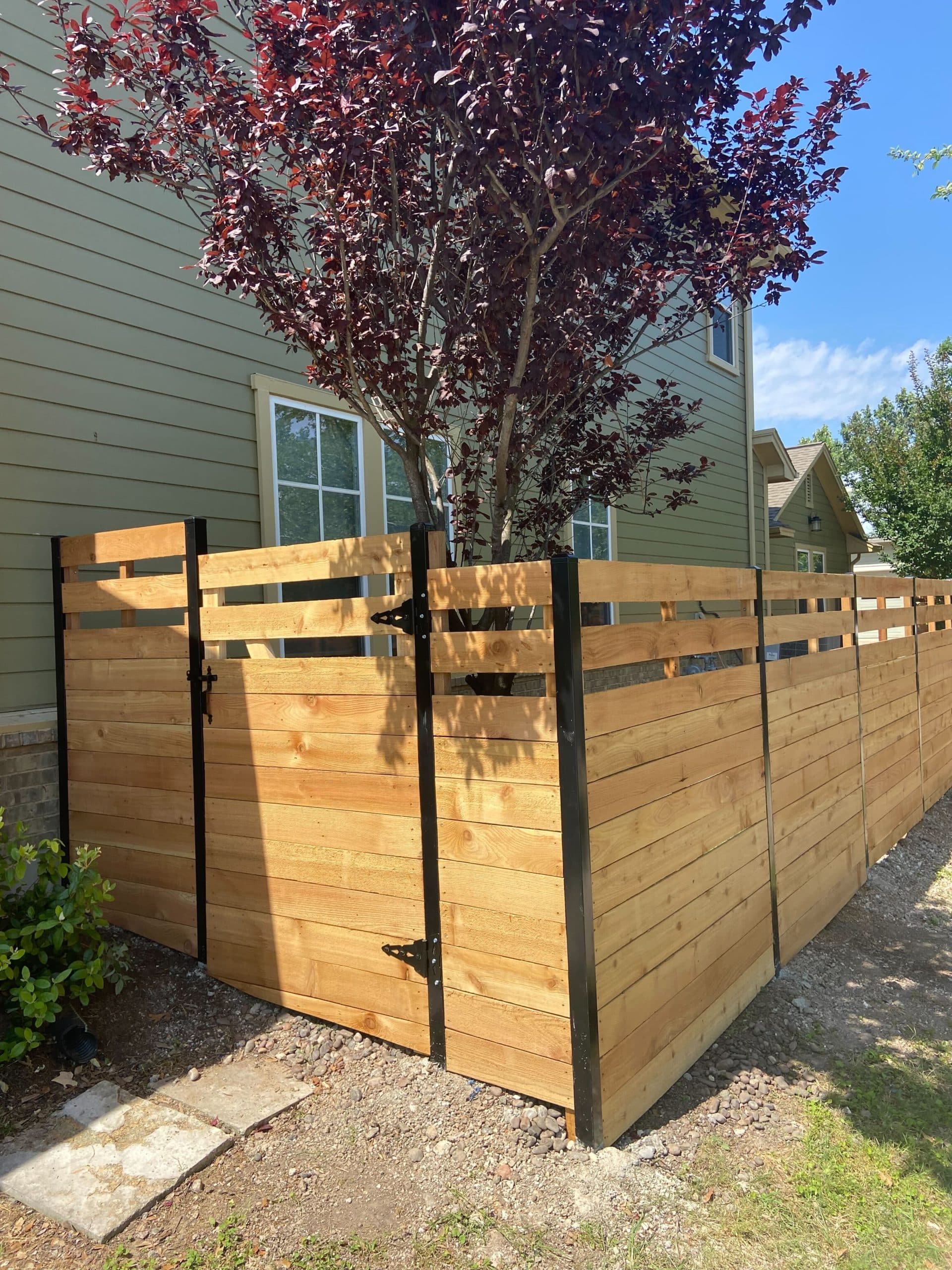Featured
Choosing the right fencing product for your home is a significant choice, and each option comes with its very own collection of advantages and challenges. Wood, plastic, and light weight aluminum are amongst the most popular materials for both residential and business secure fencing. Below's a failure of the benefits and drawbacks of each to assist you choose which is best for your requirements.
Timber Fencing. Pros:
Aesthetic Appeal: Wood offers an ageless, natural look that enhances almost any style of home. It can be repainted or tarnished in a wide variety of colors, enabling complete personalization. Whether you're going for a rustic, country-style look or an extra refined and polished appearance, timber is functional.
Cost-efficient: Generally, timber fencings are among the most budget-friendly alternatives when it pertains to upfront expenses. It's an excellent alternative for those on a budget plan that desire a high quality fence without a high price tag.
![]()
Modification: Wood can be easily adapted to fit any type of form or dimension. You can choose from various designs such as personal privacy, picket, or ranch-style fences. It's additionally easy to change, fix, or replace components if required.
Cons:
Maintenance: Timber fences call for routine upkeep. They should be stained or repainted regularly to stop warping, pest, or rot infestation. Without maintenance, timber can weaken quicker, particularly in damp or damp climates.
Susceptibility to Damages: Timber is vulnerable to harm from insects, such as termites, and climate condition, like high winds, rain, or snow. In time, direct exposure to these aspects can cause the wood to fracture, splinter, or warp.
Shorter Lifespan: While wood fencings can last for years, they usually have a shorter life-span compared to plastic or aluminum, especially otherwise preserved regularly.
Vinyl Secure Fencing. Pros:
Low Maintenance: One of one of the most attractive features of vinyl fences is that they require little to no upkeep. Unlike wood, vinyl does not require to be painted or tarnished. It's immune to fading, cracking, and bending, making it excellent for those who desire an easy fence.
Toughness: Plastic fencings are extremely resilient and can endure severe weather condition conditions, consisting of severe heat, hefty rainfall, or snow. They're likewise immune to insects like termites, which can destroy wood fences.
Lengthy Lifespan: Vinyl fencings can last for 20-30 years or more with very little upkeep. Many makers provide warranties, supplying assurance and further boosting the value of your investment.
![]()
Variety of Styles: Offered in a range of structures, styles, and shades, vinyl fences can mimic the look of wood yet without the upkeep. They are offered in vogue like personal privacy, picket, and ornamental, making them very adjustable.
Cons:
Higher Initial Price: The ahead of time price of vinyl fencing is typically greater than wood, making it much less economical for some. Its long life and reduced maintenance make it a beneficial investment in the long run.
Breakable in Winter: In cooler climates, vinyl can become breakable with time, that makes it extra prone to cracking if based on effect. This could be a problem in areas with extreme winter seasons.
Restricted Customization: While vinyl comes in a variety of styles and shades, it's not as personalized as wood. Vinyl may not be the ideal option. if you have a really certain vision in mind.
Aluminum Secure Fencing. Pros:
Low Maintenance: Aluminum is one more material that calls for extremely little maintenance. Unlike wood, it does not rust, rust, or fade. This makes it suitable for settings with severe weather or seaside areas where saltwater could create deterioration.
Toughness: Aluminum fencings are recognized for their strength and long life-span. They can endure severe weather, and unlike wood or vinyl, they are resistant to insects and will not wear away over time.
![]()
Visual Allure: Light weight aluminum fencings offer a streamlined, sophisticated look and are frequently utilized for decorative purposes. They are readily available in various styles and finishes and can enhance the general curb allure of your building.
Safety And Security: Light weight aluminum is a strong product, making it a superb alternative for providing security around your home. It's frequently made use of for domestic safety and security fencing as well as for swimming pool rooms.
Cons:
Price: Aluminum fencings are typically extra expensive than wood and in some cases even plastic, particularly when selecting ornamental or customized layouts. The preliminary price might be a deterrent for some building owners.
Much Less Personal Privacy: One of the downsides of light weight aluminum is that it generally uses less personal privacy contrasted to wood or plastic. The voids in between the slats or bars can be broad, which permits people to translucent the fence. This might not be the ideal option. if personal privacy is important to you.
Nicking: While aluminum is sturdy, it is vulnerable to denting from hefty impacts, such as automobile crashes or criminal damage. While it won't rust, a damage can jeopardize its look and integrity.
Which Material Should You Select? The decision between wood, aluminum, and plastic secure fencing boils down to your spending plan, the quantity of upkeep you're eager to take care of, and the details requirements of your residential or commercial property. If you prefer a natural, adjustable look and are ready to keep it, wood could be the way to go. Vinyl provides exceptional advantages if you prioritize toughness, durability, and low-maintenance treatment. For those that desire a sophisticated, premium look with very little upkeep, aluminum is a great alternative.
Consider your property's climate, the degree of privacy or safety you call for, and the long-term financial investment you agree to make. Whichever material you choose, each deals special advantages that can boost your home or company while giving performance and style.
Timber Fencing. Pros:
Aesthetic Appeal: Wood offers an ageless, natural look that enhances almost any style of home. It can be repainted or tarnished in a wide variety of colors, enabling complete personalization. Whether you're going for a rustic, country-style look or an extra refined and polished appearance, timber is functional.
Cost-efficient: Generally, timber fencings are among the most budget-friendly alternatives when it pertains to upfront expenses. It's an excellent alternative for those on a budget plan that desire a high quality fence without a high price tag.

Modification: Wood can be easily adapted to fit any type of form or dimension. You can choose from various designs such as personal privacy, picket, or ranch-style fences. It's additionally easy to change, fix, or replace components if required.
Cons:
Maintenance: Timber fences call for routine upkeep. They should be stained or repainted regularly to stop warping, pest, or rot infestation. Without maintenance, timber can weaken quicker, particularly in damp or damp climates.
Susceptibility to Damages: Timber is vulnerable to harm from insects, such as termites, and climate condition, like high winds, rain, or snow. In time, direct exposure to these aspects can cause the wood to fracture, splinter, or warp.
Shorter Lifespan: While wood fencings can last for years, they usually have a shorter life-span compared to plastic or aluminum, especially otherwise preserved regularly.
Vinyl Secure Fencing. Pros:
Low Maintenance: One of one of the most attractive features of vinyl fences is that they require little to no upkeep. Unlike wood, vinyl does not require to be painted or tarnished. It's immune to fading, cracking, and bending, making it excellent for those who desire an easy fence.
Toughness: Plastic fencings are extremely resilient and can endure severe weather condition conditions, consisting of severe heat, hefty rainfall, or snow. They're likewise immune to insects like termites, which can destroy wood fences.
Lengthy Lifespan: Vinyl fencings can last for 20-30 years or more with very little upkeep. Many makers provide warranties, supplying assurance and further boosting the value of your investment.

Variety of Styles: Offered in a range of structures, styles, and shades, vinyl fences can mimic the look of wood yet without the upkeep. They are offered in vogue like personal privacy, picket, and ornamental, making them very adjustable.
Cons:
Higher Initial Price: The ahead of time price of vinyl fencing is typically greater than wood, making it much less economical for some. Its long life and reduced maintenance make it a beneficial investment in the long run.
Breakable in Winter: In cooler climates, vinyl can become breakable with time, that makes it extra prone to cracking if based on effect. This could be a problem in areas with extreme winter seasons.
Restricted Customization: While vinyl comes in a variety of styles and shades, it's not as personalized as wood. Vinyl may not be the ideal option. if you have a really certain vision in mind.
Aluminum Secure Fencing. Pros:
Low Maintenance: Aluminum is one more material that calls for extremely little maintenance. Unlike wood, it does not rust, rust, or fade. This makes it suitable for settings with severe weather or seaside areas where saltwater could create deterioration.
Toughness: Aluminum fencings are recognized for their strength and long life-span. They can endure severe weather, and unlike wood or vinyl, they are resistant to insects and will not wear away over time.

Visual Allure: Light weight aluminum fencings offer a streamlined, sophisticated look and are frequently utilized for decorative purposes. They are readily available in various styles and finishes and can enhance the general curb allure of your building.
Safety And Security: Light weight aluminum is a strong product, making it a superb alternative for providing security around your home. It's frequently made use of for domestic safety and security fencing as well as for swimming pool rooms.
Cons:
Price: Aluminum fencings are typically extra expensive than wood and in some cases even plastic, particularly when selecting ornamental or customized layouts. The preliminary price might be a deterrent for some building owners.
Much Less Personal Privacy: One of the downsides of light weight aluminum is that it generally uses less personal privacy contrasted to wood or plastic. The voids in between the slats or bars can be broad, which permits people to translucent the fence. This might not be the ideal option. if personal privacy is important to you.
Nicking: While aluminum is sturdy, it is vulnerable to denting from hefty impacts, such as automobile crashes or criminal damage. While it won't rust, a damage can jeopardize its look and integrity.
Which Material Should You Select? The decision between wood, aluminum, and plastic secure fencing boils down to your spending plan, the quantity of upkeep you're eager to take care of, and the details requirements of your residential or commercial property. If you prefer a natural, adjustable look and are ready to keep it, wood could be the way to go. Vinyl provides exceptional advantages if you prioritize toughness, durability, and low-maintenance treatment. For those that desire a sophisticated, premium look with very little upkeep, aluminum is a great alternative.
Consider your property's climate, the degree of privacy or safety you call for, and the long-term financial investment you agree to make. Whichever material you choose, each deals special advantages that can boost your home or company while giving performance and style.
Latest Posts
Safeguard and Beautify Your Home with Weathercraft's Home siding Solutions
Published May 10, 25
1 min read
Strategic Marketing That Comes Full Circle
Published May 10, 25
1 min read
Strategic Advertising That Comes Full Circle
Published May 10, 25
1 min read